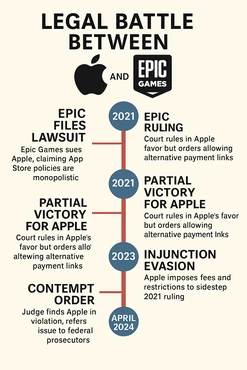Judge finds Apple willfully defied an App Store antitrust ruling
May 1, 2025
- Federal judge slams Apple for willfully defying App Store antitrust ruling and refers matter for criminal contempt investigation
- CEO Tim Cook and other executives accused of obstructing court orders to maintain App Store dominance
- New ruling forces Apple to allow app developers alternative payment links and bans related fees
In a stunning legal escalation, a federal judge has referred Apple to federal prosecutors for a criminal contempt investigation, accusing the tech giant of deliberately defying a court order tied to its App Store practices.
Judge Yvonne Gonzalez Rogers, overseeing the long-running case between Apple and Epic Games, ruled late Wednesday that Apple had willfully chosen not to comply with an earlier injunction requiring the company to loosen its App Stores stranglehold on payments and subscriptions.
Apple created new anticompetitive barriers with the express intent of thwarting this courts order, Judge Rogers wrote in a sharply worded decision that directly criticized CEO Tim Cook and accused another executive, Alex Roman, of lying under oath, the Wall Street Journal reported.
Epics win, Apples setback
The ruling stems from Epics 2021 lawsuit, which accused Apple of monopolistic behavior over its tight control of the App Store ecosystem. While the original verdict largely favored Apple, the court ordered the company to let developers direct users to alternative payment methodsa critical win for app makers.
This weeks order makes that ruling ironclad: Apple must stop blocking developers from steering users to outside payment options and can no longer impose fees when users make purchases outside the App Store.
“Apples continued attempts to interfere with competition will not be tolerated,” Gonzalez Rogers said, according to Reuters. She added: “This is an injunction, not a negotiation. There are no do-overs once a party willfully disregards a court order.”
Epic CEO Tim Sweeney hailed the decision as a huge victory for developers.
Executives under fire
 Judge Rogers took direct aim at Apples leadership, writing that Cook ignored internal advice from veteran exec Phil Schiller and instead sided with the companys finance team, which prioritized revenue protection. Apple had responded to the 2021 order by imposing a 27% workaround fee for alternative payment links, a move Rogers said violated the spirit of her injunction.
Judge Rogers took direct aim at Apples leadership, writing that Cook ignored internal advice from veteran exec Phil Schiller and instead sided with the companys finance team, which prioritized revenue protection. Apple had responded to the 2021 order by imposing a 27% workaround fee for alternative payment links, a move Rogers said violated the spirit of her injunction.
The courts findings also allege that Apple VP Alex Roman outright lied under oath about Apples compliance efforts, deepening the legal peril for the company.
Broader implications
This ruling could have far-reaching international effects. It might break the logjam that has enabled Apple to delay complying with similar requests in other jurisdictions, said Fiona Scott Morton, a former antitrust official in the Obama administration.
Just last week, the European Commission fined Apple over similar antitrust violations.
Though Apple said it disagrees with the court and plans to appeal, the new ruling signals that the companys lucrative App Store feeslong a flashpoint for developersface growing legal pressure both in the U.S. and abroad.
In the short term, Apples shares slipped in after-hours trading following the news. Whether iPhone users, accustomed to in-app purchases, will shift to external payment methods remains a critical unknown that could redefine Apples digital marketplace.
#Bad #Apple #Company #faces #criminal #contempt #probe